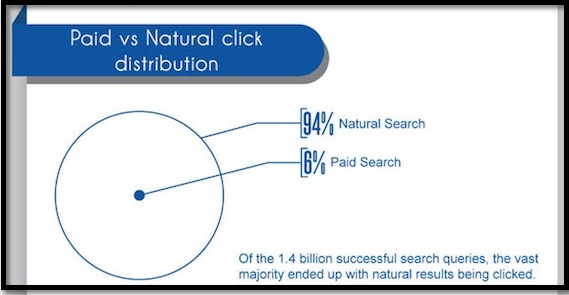Last week, we reported on a recent calculation that showed paid search was taking over the search engine results pages (SERPs). This was experimental math by a local business owner who was concerned that organic search was dead.
While organic search isn’t dead, there is another facet of the SERP worth exploring and one we hear about ever so often: When presented with multiple choices, where do users click on the SERP and do they even know what they are clicking on?
Where Users Click and Why
A 2012 study of 1.4 billion searches in the UK by GroupM UK and Nielsen showed the organic listing won 94 percent of the clicks.

But earlier this year, research by UK-based Bunnyfoot showed 81 out of 100 customers clicked on AdWords over the organic listings in Google.
Because the methodology and sample was so different, of course it’s hard to compare the two, but feedback from the respondents in Bunnyfoot’s research was intriguing.
Bunnyfoot research showed 4o percent had no clue the ads were actually paid listings, citing the following reactions, to name a few:
- “…the first 3 that meet my search criteria, presumably the best.”
- “…best match for what you have put in the search. They have got the words that you have put in or are the most popular.”
- “…the most searched I guess.”
But surely the younger generation is able to decipher paid from organic, right? According to the eConsultancy data, only 5 percent ages 2 to 17 click on paid listings, and the tendency to click on paid ads grew as age increased.
However, this post by Glenn Gabe painted a different picture of our youth’s insight into the SERP. Which begs the question …
Even the Next Generation Has No Clue?
As savvy as the next generation is with technology, that doesn’t mean they understand the intricacies of search. Gabe presented on two different occasions to U.S. middle schoolers, and on both occasions, asked the groups to point out which listings on a SERP were paid and which were organic.
Not one student was able to do so.
“Think about this for a minute,” Gabe wrote in his post. “How many paid search clicks are occurring right now from younger web users that have no idea that those listings are advertisements? Let’s face it, there can’t be a trust issue with paid search if you don’t know they are paid ads in the first place.”
The FTC Tries to Make Sense of it All
 On the matter of trust, this is the FTC’s current issue with search engines and paid listings. More than 10 years and countless changes to the SERP finally prompted new FTC guidelines for paid search listings last month.
On the matter of trust, this is the FTC’s current issue with search engines and paid listings. More than 10 years and countless changes to the SERP finally prompted new FTC guidelines for paid search listings last month.
In a letter sent out to numerous search engines, the FTC voiced concerns over a SERP that may not be understood by users:
“We have observed that search engines have reduced the font size of some text labels to identify top ads and other advertising and often locate these labels in the top right-hand corner of the shaded area or ‘ad block,’ as is the case with top ads. Consumers may not as readily notice the labels when placed in the top right-hand corner, especially when the labels are presented in small print and relate to more than one result.”
The FTC also recommended ways to remedy any doubt:
“We recommend that in distinguishing any top ads or other advertising results integrated into the natural search results, search engines should use: (1) more prominent shading that has a clear outline; (2) a prominent border that distinctly sets off advertising from the natural search results; or (3) both prominent shading and a border.”
Regardless of which listings get more clicks, in the case of how much the average user actually knows about the SERP, the jury is still out. In last week’s post on organic search, I made a point to say that I glaze over the ads at the top of the SERP automatically, and assumed others did that, too. But just how many know enough to make the choice to do that is the question.

 On the matter of trust, this is the FTC’s current issue with
On the matter of trust, this is the FTC’s current issue with